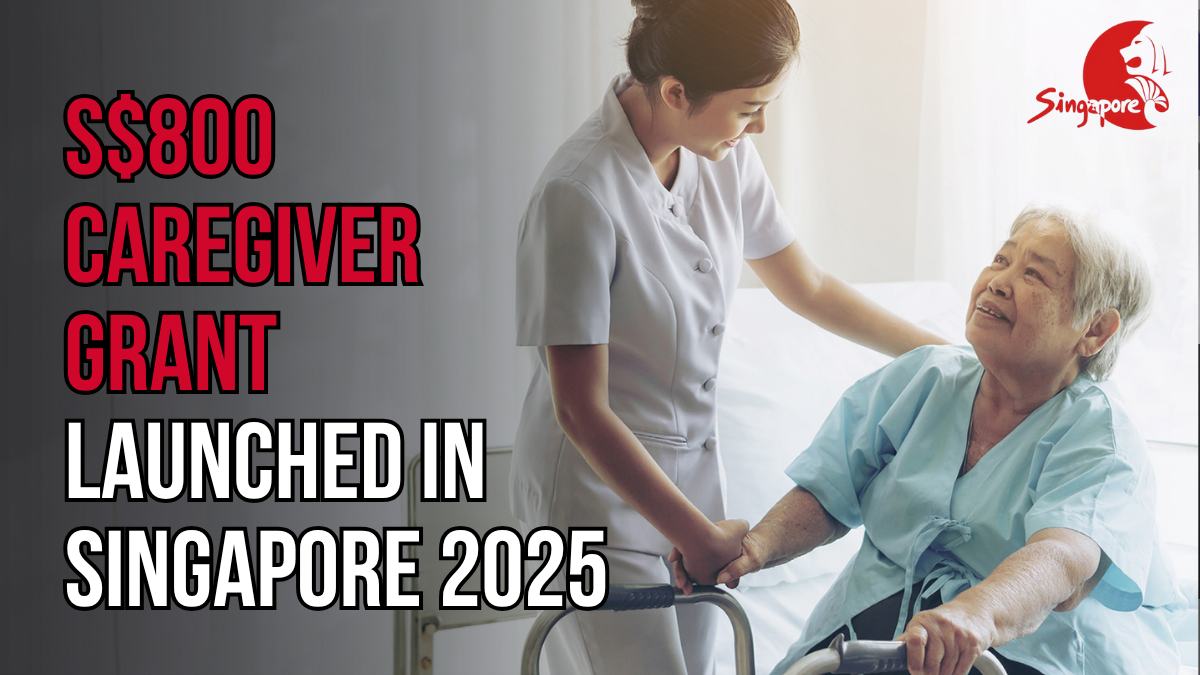In response to the increasing caregiving responsibilities faced by families and the nation’s rapidly ageing population, the Singapore government has introduced the Caregiver Relief Grant 2025. This initiative provides a S$800 annual cash grant to individuals who offer full-time, unpaid care to elderly family members.

Designed to ease both the emotional and financial burden on caregivers, this new grant complements Singapore’s broader efforts to build an inclusive society that values and supports ageing in place. With the number of citizens aged 65 and above projected to rise sharply in the coming years, the grant plays a critical role in sustaining home-based eldercare and acknowledging the vital contributions of caregivers.
Summary of the 2025 Caregiver Relief Grant
Key Information |
Details |
|---|---|
Grant Name |
Caregiver Relief Grant 2025 |
Amount |
S$800 (annual one-time payment) |
Eligibility Age (Caregiver) |
21 years and older |
Care Recipient Requirements |
Aged 65+, physically dependent or diagnosed with dementia/cognitive decline |
Household Income Cap |
Below S$5,000 per month |
Living Arrangement |
Caregiver must live in the same household as the care recipient |
Application Platform |
Through the Agency for Integrated Care (AIC) |
Disbursement Schedule |
Once annually upon successful application |
Official Website |
The Urgency Behind the Initiative: Why It Matters Now
Singapore is facing one of the fastest ageing populations in the region. According to national demographic projections, nearly one in four Singaporeans will be over the age of 65 by 2030. With this shift, the demands on family-based care have surged.
Traditionally, caregiving roles fall on immediate family members, particularly adult children or spouses, many of whom are balancing full-time jobs and other responsibilities. The financial strain, emotional stress, and physical demands associated with caregiving are often overwhelming.
The S$800 Caregiver Relief Grant is a timely and strategic intervention. It not only helps to cover practical caregiving expenses but also symbolizes public recognition of the crucial and often unspoken contributions caregivers make to both their families and society.
Who Is Eligible: Detailed Breakdown
The grant is targeted specifically at unpaid family caregivers who provide ongoing support to elderly relatives within the same household. Eligibility criteria are as follows:
Caregiver Requirements:
- Must be a Singaporean citizen aged 21 or older.
- Must reside in the same household as the elderly care recipient.
- Must be the primary, unpaid caregiver (i.e., not receiving a salary for care work).
Care Recipient Requirements:
- Must be a Singaporean aged 65 years or older.
- Must be physically dependent in daily living activities or have a clinically diagnosed cognitive impairment such as dementia.
- Must reside full-time in the same household as the caregiver.
Financial Eligibility:
- The total monthly household income must not exceed S$5,000.
- Caregivers from households that slightly exceed this threshold may still be considered based on special circumstances, subject to review.
Application Process:
Applications must be submitted via the Agency for Integrated Care (AIC) portal and include:
- Medical documentation or official assessments of the care recipient’s condition.
- Verification of household income and living arrangements.
- A caregiving needs assessment, usually conducted by a community care provider.
Visit the AIC site to apply: https://www.aic.sg
How the Grant Will Help: Financial and Emotional Relief
While S$800 may not fully cover the total costs of caregiving, it significantly helps with day-to-day expenses such as:
- Medical consumables (e.g., adult diapers, wound dressings)
- Mobility aids (e.g., walkers, wheelchairs)
- Transportation costs for medical appointments
- Respite care services (e.g., part-time help or caregiver day-outs)
- Minor home modifications (e.g., installing grab bars)
More importantly, the grant represents a national acknowledgment of caregiving as real, valuable work. Caregivers frequently forgo promotions, reduce working hours, or leave employment altogether, resulting in long-term financial insecurity. This payment serves both a practical and symbolic role in highlighting caregiving as a shared societal responsibility.
Supporting Mental and Physical Well-being of Caregivers
A study by the Institute of Mental Health in Singapore found that nearly one in two caregivers report moderate to high levels of stress. Burnout, sleep deprivation, and social isolation are common.
In response, the government has paired the Caregiver Relief Grant with expanded support services, including:
- Free or subsidised caregiver training in safe lifting, dementia care, and medication management
- Home nursing support to temporarily take over care duties
- Day care centres for elderly patients needing supervised care during the day
- A new “Caregiver Hub” digital platform, launching in late 2025, that will:
- Centralize applications for grants and subsidies
- Offer virtual mental health check-ins
- Provide booking for part-time caregiver relief
- Track eligibility for additional government benefits
These services aim to build a sustainable caregiving ecosystem, enabling families to continue providing quality home-based care without sacrificing their own well-being.
Complementing a National Vision for Inclusive Ageing
The Caregiver Relief Grant is a cornerstone of Singapore’s “Ageing with Dignity” strategy, which seeks to reduce reliance on institutional eldercare and empower families to support loved ones at home.
By 2030, the government plans to:
- Increase the number of home- and community-based eldercare services
- Expand training opportunities for volunteer and professional caregivers
- Reduce the stigma of elder dependency and cognitive decline through public education campaigns
This grant not only provides monetary assistance but supports the cultural shift needed to normalize, respect, and reinforce caregiving roles in the family unit.
Frequently Asked Questions (FAQs)
1. Who can apply for the Caregiver Relief Grant?
A. Singaporean citizens aged 21 or above who provide unpaid care to an elderly family member living in the same household and meeting the dependency criteria.
2. Is there an income limit to qualify?
A. Yes, the household’s monthly income must be S$5,000 or less to qualify.
3. How do I apply for the grant?
A. Applications can be submitted online through the Agency for Integrated Care (AIC) at https://www.aic.sg, along with supporting documents.
4. When will the funds be disbursed?
A. Funds will be disbursed annually, upon successful application and review.
5. Can the grant be used for respite care or part-time help?
A. Yes, the grant is intended to offset caregiving-related costs, including respite care, transportation, and daily care items.
6. Does the elderly person have to be officially diagnosed with dementia?
A. Not necessarily. The care recipient must be either physically dependent in activities of daily living or have a clinically diagnosed cognitive impairment, which includes but is not limited to dementia.
Conclusion: Valuing Care, Strengthening Families
The S$800 Caregiver Relief Grant 2025 is a meaningful investment in Singapore’s future — a future that acknowledges and uplifts the unseen contributions of caregivers. As the population ages, the need for robust, family-centered care solutions becomes increasingly urgent. This grant is more than a financial measure; it’s a national affirmation that caregiving is not an isolated act of duty but a shared mission of compassion.
To learn more or apply, visit the official website:
https://www.aic.sg
For More Information Click Here










